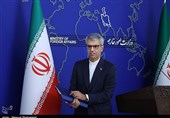EU Seems to Be Obsessed with Anti-Russian Sanctions: Lavrov
TEHRAN (Tasnim) – The European Union’s anti-Russian sanctions look rather like an obsession that has little link with the realities of practical politics, Russian Foreign Minister Sergey Lavrov said.
It is just "a small but very aggressive group of nations" that is pushing the European Union to continue confrontation with Russia and keep in place the anti-Russian sanctions until "Moscow implements the Minsk agreements," Lavrov said in an interview with the Rossiiskaya Gazeta. "The Russophobic minority in the European Union is openly capitalizing on the principle of consensus."
"It has little to do with practical politics, it rather looks like an obsession with the sanctions," he stressed, TASS reported.
According to the Russian top diplomat, Ukraine’s former President Pyotr Poroshenko was in the habit of using this position of the European Union and "the new Ukrainian authorities are also using it now." "They (Ukraine’s authorities) are not going to do anything because if they do nothing the Minsk agreements will never be implemented and the European Union, following this logic, will keep the anti-Russian sanctions in place. While Ukraine will receive donation from the West," he said.
He drew attention to the fact that European businesses was suffering "losses of many dozens, if not hundreds, of billions of euros" from the anti-Russian sanctions. "Many representatives from the European Union member nations tell us in private conversations that they are against the sanctions, that these sanctions are harmful. But they have the principle of solidarity, the principle of consensus," he noted.
"As far as I understand, consensus is a consent among all. And is someone, and there are a lot of them, as they tell us in bilateral contacts, is against the sanctions, there cannot be any consensus. And what we have now is this Russophobic minority abusing this consensus rule to make all the rest stick to this absolutely ungrounded and absurd position that the sanctions should depend on the implementation of the Minsk agreements," Lavrov said.






